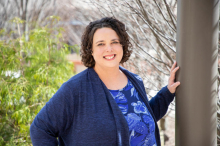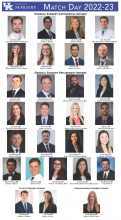Dozens of UK medical students match into surgery-related residency programs on Match Day
During Match Day 2022 in mid-March, 27 graduating students from the University of Kentucky College of Medicine matched into several Surgery-related residency programs. Of those 27, University of Kentucky residency programs welcomed 13 of those students, including one match to the recently established UK General Surgery Residency Program in Bowling Green.
‘Research Made Possible’ Podcast: Schoenberg on Community-based Research
The best solutions begin when you listen to the people whose problems you’re trying to solve. That community-based focus — the crux of what Nancy Schoenberg, Ph.D., says is her approach as a medical anthropologist — has been a guiding value through her 25 years at the University of Kentucky. In this “Research Made Possible” podcast, Schoenberg shares what drives her work on diabetes and cancer in rural communities across Kentucky.
Four Years in, UK College of Medicine Makes Impact in Bowling Green Community
Bowling Green, Ky., native Caitlyn Galloway always felt right at home in a small town, but that posed a challenge when she made plans to apply for medical school. She wanted to stay close to home, but in her third year of undergraduate studies at Western Kentucky University, there were no four-year medical schools where she grew up that would allow her to stay near her small, close-knit community.
She soon found out that was about to change.
‘Wildcat Wednesday’: Junior Meron Lemma Making Impact on Global Health Systems Through Research
LEXINGTON, Ky. (March 9, 2022) — Throughout March for Women’s History Month, the University of Kentucky is spotlighting Women Making History. These women are leading their fields of research, crossing traditional academic boundaries and impacting Kentucky’s most pressing challenges, including opioid use disorder treatment, aging and Alzheimer’s, water and air filtration, environmental impacts on health and suicide prevention.
Behavioral Science Awards White Coats for Black Lives Fellowships
LEXINGTON, Ky. (March 23, 2022) — University of Kentucky College of Medicinestudents Rashmi Bharadwaj, Maya Cleveland, Lillian Maxwell, Darayon Moore and Maggie Stull have been awarded Department of Behavioral Science White Coats for Black Lives Fellowships.
UK College of Medicine Celebrates Match Day, Including First Ceremony at Bowling Green Campus
LEXINGTON, Ky. (March 22, 2022) — Match Day is always a special event for the University of Kentucky College of Medicine. This year, the college added to the excitement by celebrating an incredible milestone in its mission of training more physicians in Kentucky, for Kentucky.
Match Day 2022: UKEM Announces New Intern Class
'They Treat Me Like a Person, Not a Chart': Colon Cancer Patient Thankful for Markey Team
LEXINGTON, Ky. (March 21, 2022) — Lindsey Musick’s life is busy.
A mom of three kids, it is not surprising that sometimes the stresses of life can feel overwhelming.
And that is exactly what doctors kept telling Musick was the culprit of her digestive issues.
For four years, the Pikeville resident, experienced abdominal cramping, on-again, off-again blood in her stool and occasional weight loss. She says her doctors generally brushed off her symptoms as stress and ordered several blood tests and x-rays to rule things out.
UK College of Medicine Celebrates Match Day, Including First Ceremony at Bowling Green Campus
Match Day is always a special event for the University of Kentucky College of Medicine. This year, the college added to the excitement by celebrating an incredible milestone in its mission of training more physicians in Kentucky, for Kentucky.
The college’s first regional campus in Bowling Green, Ky., which opened in 2018, celebrated its first Match Day on Friday, March 18. Because of the regional campus celebration, the Class of 2022 was the College of Medicine’s largest group of students recognized at this annual event.
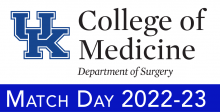
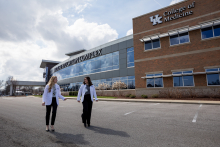
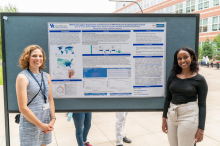
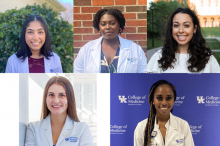
![Image[43].jpeg](/sites/default/files/styles/medium/public/article/images/Image%5B43%5D.jpeg?itok=Fd104Iw-)
